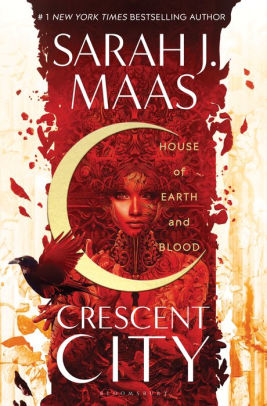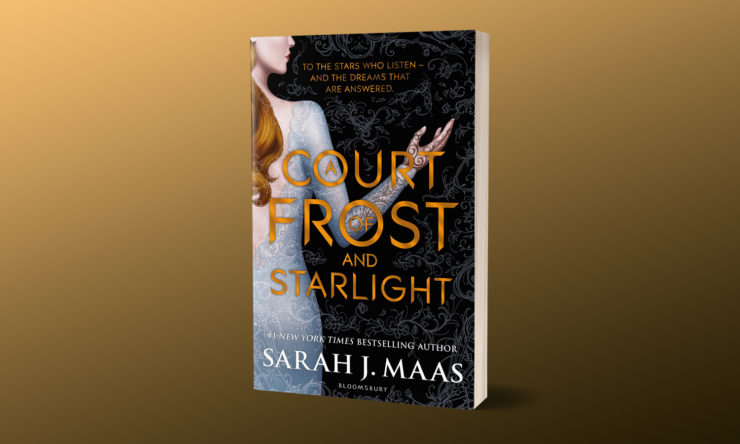With this book—a winter wrap-up for the major threads of A Court of Thrones and Roses—it’s hard to say anything brief without spoilers for the previous books. So let’s get right to it.
In 2018, I read all of Throne of Glass in just a few weeks, and chronicled the whole thing here. This year, while we wait for the March release of Maas’s first adult novel, Crescent City, it’s time for A Court of Thorns and Roses!
As before, this is a first-read, so please: no spoilers in the comments for the series beyond the book currently under discussion.
What Happens in A Court of Frost and Starlight
In the days before the Winter Solstice—a major celebration in the Night Court, naturally, since it’s the longest night of the year—Feyre, Rhys, and their friends prepare for the festivities, but not everyone is feeling fully festive. Nesta has isolated herself from the group in an apartment across town. Cassian, Rhys, and Azriel have something up their sleeves, and are also dealing with dissent and shit-stirring in the Illyrian ranks. South, in what’s left of the Spring Court, Tamlin is a wreck.
But happiness also holds sway in Velaris: Amren is cozied up with her Summer Court boyfriend, and Feyre finds herself doing some totally new things: making a new friend, and going shopping—which is hard for her to feel comfortable doing, given her impoverished past. Elain, relaxed in the presence of Nuala and Cerridwen, turns from growing things in the garden to making things in the kitchen.
The Solstice brings them together, not all healed, but working on it, and trying to accept the ways “working on it” looks different for everyone. And that some of their stories may go in different directions now that the war is over—but the work’s not yet done. Feyre sets up an art therapy school with her new friend Ressina, while Rhys gives her a place to build a new home for them, and the child she wants to give him. Morrigan disappears to her estate, peering into the woods at some other kind of darkness. Cassian works to create change among the Illyrians. And Feyre and Rhys settle in to their happily ever after.
Sweetness and Snow
Frost and Starlight feels very much like it could have been a final section of Wings and Ruin—a little more closure for the gang after the war. It’s a few months later, in this story, and life has become largely … normal. There’s paperwork and everything! (And for Amren, the insulting inconvenience of a regular body, with all its attendant needs. Yes, she complains about having to use toilets. It’s kind of great.)
And Feyre makes a friend—her own friend, not one that came as a package deal with Rhysand. (Not that there’s anything wrong with those, but it’s also good to have your own!) Ressina is also a fighter—she’s the female Feyre saw during the attack on Velaris, fending off enemies with just a pipe—and an artist. She doesn’t fuss over Feyre, doesn’t speak to her like she’s the High Lady, but treats her as another person who has every right to be in the artists’ quarter. She even invites Feyre to a Fae artist stitch ‘n’ bitch, which sounds like maybe the best time a person could have in this town.
Buy the Book


House of Earth and Blood
Even though I read these books fairly quickly, it’s easy to forget where Feyre came from. She adapts quickly (where does she learn to manage a court-sized budget?), she blends in with her highbrow friends, she masters her powers. But it’s only been two years since she was a hungry girl in the woods standing over the body of a wolf, and giving her this book’s story—a story about the pleasures of making yourself useful, and finding your own place in the world—is important. It brings together her High Lady life and her Feyre life from before: she wants to keep busy and helpful (though she’s certainly earned some rest), but not in a way that’s about fighting and hunting. It’s still helping people, her work, but it’s meeting another kind of need.
It was obvious to me as soon as she met the weaver that Feyre’s Solstice “gift” to Rhysand would be that she wants to have a baby, and I know this is probably very sweet to some, but the language of “giving” a male partner a child has always set my teeth on edge. I can set aside my own crankiness at that phrasing long enough to say that this, too, is about living: about feeling safe enough to plan for a future. It goes back to Lucien’s awe, in the last book, that there were children laughing in the street in Velaris. One of them will be Rhys and Feyre’s, one day.
I realize I’ve not had a lot to say about Rhysand in this whole read-through and that’s because to Feyre, he’s perfect: He’s the hottest and the most powerful and he understands Feyre’s trauma and he makes sure to get consent on everything and he’s the best at sex and so on and so forth. But there are ways in which he’s not perfect to everyone else (especially Mor, in Wings and Ruins), and I think it would’ve been interesting if Maas leaned into those places a little more, to make him a little more complicated.
He’s got a martyrdom streak a mile wind (as evidenced by him dying, though not for long) and a habit of sticking his hands in his pockets when he’s working on being extra sly. In my head he’s often a vaguely handsome tall, dark shape next to Feyre: he doesn’t take a very precise form, because he seems like a composite of good hero traits. He’s so good, he goes to check on Tamlin, and makes him dinner, and arranges for his borders to be guarded. Though he’s not the greatest at snowball fights, apparently.
Yes, Good, More Please
I’m pleased that one of my complaints from the last book—that everyone in Rhys’s inner circle seems quite progressive, but doesn’t try to do anything about the oft-seen rampant misogyny—is part of the focus for Cassiand and Rhys, with their work among the Illyrian camps. I don’t think all of this is handled particularly well in the narration, which is more about in the noble actions of our heroes than the results for the Illyrian “girls,” but I’m still glad it’s actively addressed. Now, fellas, let’s talk about that Blood Rite, ok? And maybe the way the mating bond is used to excuse some pretty crummy behavior among males?
Morrigan Deserves Better
She just does. It was so exciting to see her name at the start of a chapter—and so disheartening to find that it’s the story of her trauma, again, but this time told in first-person. It’s good that Feyre realized she needs to support Mor, not boss her around, and that Mor will decide for herself when she wants to tell everyone else (though how she’s been keeping her secrets from mind-readers and spies, who can say).
But to make Mor’s chapter be about the men who cruelly hurt her, to once again revisit the shame and suffering she went through—it’s one thing to have trauma in a character’s backstory (and trauma is pretty evenly handed out, here). It’s another to keep defining your one queer main character by her trauma. I want to know what it means that truth is her gift. I want a story about Mor, young and in love. And at the very least I want to know what she sees in the woods in her other chapter. At least she has her estate. And she’s a horse girl. There’s more to her than what her father and Eris did, and she deserves for that story to be told.
Setting the Stage
And to be honest, much of Frost and Starlight seems to be setting up potential next stories. Maybe it’s Mor, on her horses, riding off to an adventure. Maybe it’s Jurian and Vassa and Lucien, a strange alliance in the human territory, a Band of Exiles trying to create a bridge between human and Fae worlds. (Maybe it’s Bryaxis! A reader can dream.) (Please let it not be Tamlin Puts Himself Together Again, though.) Maybe it’s Amren, though she seems pretty content with her puzzles and her dragon’s hoard of jewels.
But that teaser at the very end sure suggests it’s Cassian and Nesta. Maas does quite a bit of work on Cassian’s personality in this short book: he twirls Feyre, which surprised me, and nothing made me laugh as much as his names for Nesta’s expressions (I Don’t Want Cassian to Know I’m Reading Smut: a classic) and calling Amren an angry snowball. They’re small things, but she’s bringing forward what he is besides a gifted warrior. Azriel gets a bit of this, too, notably in his insistence on everyone waiting to eat—a need for everyone to respect Elain and the work that went into feeding them. In the quiet moments, after the war, people can do more than fight and plan and live, and we get to see that here.
And we get to see Nesta, living how she chooses, even if everyone else disapproves. (To be honest, I too would probably be processing some of my shit in a dive bar.) When she goes home, alone, to the cold apartment that she can’t bear to heat because she can’t stand the sounds of the fire, we finally get to see her—and to see how she’s muting all that anger into nothingness. I don’t think she needs to feel shame over taking money from Feyre, though. Did she not also fight in that war? Didn’t she sacrifice and kill and do things no one else could do?
I don’t want to dig too much into the teaser at the end, given that there isn’t a title or pub date for the next book yet. (But Feyre sure has a lot of compassion for people when they are processing their shit in a way she approves of, and not nearly enough when she doesn’t.) It’ll be interesting if Maas picks up so quickly on the heels of this first narrative arc, and in the same place, and carrying some of the same baggage.
Frost and Starlight is part happy ending; part an attempt for the characters to grapple a bit more with the repercussions of the war they just waged—the scars and losses that haunt not just them, but their people and their city; and part bridge to whatever’s next in this world. What are you hoping for?
Molly Templeton has been a bookseller, an alt-weekly editor, and assistant managing editor of Tor.com, among other things. She now lives and writes in Oregon, and spends as much time as possible in the woods. You can also find her on Twitter.










